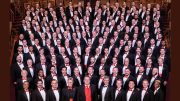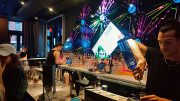By: Mike Givens*/TRT Assistant Editor—
I was in the seventh grade the first time I experienced an overt act of hatred. I was in science class and asked a classmate a benign question, to which she responded, “you’re weird.” Her best friend at the time, a woefully damaged and tragic young girl who had always disliked me, caustically yelled, “Because he’s a faggot.” I didn’t respond. Instead, I dejectedly returned to my seat and spent the rest of the class period smoldering in embarrassment, self-loathing and an incredible amount of shame.
In college, a friend of mine who lived in the dorm room next to me during summer session had a small party in his room one night with a few of his friends. I wasn’t invited so I sat in my room doing homework when I clearly heard my friend and his guests start singing a song. Though I can’t remember the words to the song, I clearly remember the song ending with “dead nigger,” and the entire group proceeded to laugh uproariously. The incident was the death knell of that friendship. [pullquote]I recently turned 34 and realized the concept of “othering” has consistently been one of the bedrock experiences of my life. But it’s not just my life that has suffered from the disheartening sting of social rejection and ignorance. We’ve all experienced it, to some extent. Some of us more than others.[/pullquote]
I recently turned 34 and realized the concept of “othering” has consistently been one of the bedrock experiences of my life. But it’s not just my life that has suffered from the disheartening sting of social rejection and ignorance. We’ve all experienced it, to some extent. Some of us more than others.
I’m privileged in that I’m a well-educated, cisgender male. However, my skin color, sexual orientation, and impoverished childhood all work against me in some form in my adulthood. And it’s like that for many of us. Our skin color, gender at birth, financial means, access to education, and myriad other social, cultural, racial and ethnic markers can either be a check or a minus on the interpersonal “report card” we all use to evaluate others.
I’ve been called a range of pejoratives, from “weird” to “faggy” to “nigger” to “darkie” and several other choice words. I’ve had my skin color used as a reason why I wouldn’t be a suitable lover or partner; I’ve had my sexual orientation weaponized by others for the purpose of attacking my masculinity and worth. [pullquote]Our skin color, gender at birth, financial means, access to education, and myriad other social, cultural, racial and ethnic markers can either be a check or a minus on the interpersonal “report card” we all use to evaluate others.[/pullquote]
I’ve no delusions. I highly doubt that during my lifetime I’ll see the day when we learn to accept other people for who they are, as they are. I won’t live long enough to see gay and bisexual men stop referring to those without STIs or HIV/AIDS as “clean;” a time when bisexual or transgender people won’t be viewed as oddities; a period when those of us who don’t need to lay on a beach at all because we’re already tan won’t be arrested, shot, beaten, stabbed, and dehumanized by police officers.
What I do have hope for, what keeps me going, is the innate desire to see myself evolve into the type of person who sees beyond those things. I’ve dedicated my adult life to social justice, to moving people from point A to point B on issues.
I’ve prided myself on that. I’ve taken great satisfaction in knowing that I’m fighting a worthy fight. But there’s a certain hubris in that way of thinking; a deeply self-centered idealism that allows the “us vs. them” mentality to consistently make “us” feel like we’ve done (and can do) no wrong, that we’re better. [pullquote]I’ve been called a range of pejoratives, from “weird” to “faggy” to “nigger” to “darkie” and several other choice words. I’ve had my skin color used as a reason why I wouldn’t be a suitable lover or partner; I’ve had my sexual orientation weaponized by others for the purpose of attacking my masculinity and worth.[/pullquote]
But there’s a fallacy in that logic. We’re not perfect. And those of us who are progressive, liberal, socialist or any other “left-leaning” idiom, have just as much a duty to evolve and grow as the conservative, “right-wing” friends, family members, TV hosts, and voters we so often rail against.
But what does evolution look like? It’s the consistent challenging of oneself to outgrow the ignorant, hurtful lessons we learn as children. It’s the ability to look at people like Donald Trump, Kim Davis and other backwards people who use religious dogma or sheer ignorance to justify their prejudices and hatred and viewing them as flawed human beings who need to be reasoned with, not discarded.
I once had a mentor tell me, “Never shut people out. Because if you shut them out, you’re not giving them the room to grow, to change.”
I’ve forgiven that classmate who called me a faggot; I’ve let go of the anger at the former college friend who sang about “niggers.” I’ve replaced the hatred and bitterness with a sense of solemn dedication; a commitment to never, ever let that type of malevolence rule me. Here’s hoping we all resolve to extend a graciousness of spirit to those ruled by their own insensitivities and callousness.
*A graduate of the Boston University College of Communication, Mike Givens has been a social justice advocate for more than seven years. During that time he’s worked on a range of initiatives aimed at lifting up marginalized populations. An experienced media strategist and public relations professional, Michael currently devotes his spare time to a number of vital issues including racial justice and socioeconomic equity.









Congratulations!
Isabel Cruz, Rn, PhD